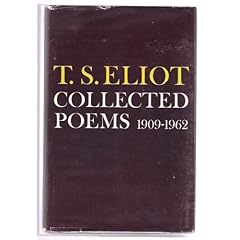 I hardly pretend to be a poetry critique. In fact, I would consider myself to be an amateur of the poetry world - and not in the french sense amateure. At this stage, I'm not even sure I am of fan of the genre. That being said, I am nothing if not devoted to slogging through works of "quote" great writers. And to this end, I must enter the Waste Lands, so to speak.
I hardly pretend to be a poetry critique. In fact, I would consider myself to be an amateur of the poetry world - and not in the french sense amateure. At this stage, I'm not even sure I am of fan of the genre. That being said, I am nothing if not devoted to slogging through works of "quote" great writers. And to this end, I must enter the Waste Lands, so to speak.Eliot is without a doubt one of the most recognized names of poetry - be it 20th or any Century. Millions of North American high schoolers have anguished at the chore of reading Eliot's work. Actually, let me rephrase - not the chore of reading his work, but rather in attempting to understand it. At stages, I consider all poetry to be fluff and drivel. However, there is the odd sequence of lines that illuminate the beauty of not only the work, but dare I say, life itself. And for this reason alone, I persist. I carry on. I attempt to apply what little patience I have to understanding Eliot's work. My weakness, or rather my failings, are that I often feel confronted by a enormous wall of intellect. Eliot's far eastern studies, his knowledge of theology - both eastern and western - and his ability to pull from a variety of antequated and modern sources, all make for a daunting challenge for those who seek to not simply understand, but appreciate his work. His work humbles me, if for nothing more, that it challenges me to return to it at a later date whence I would presumably have found elucidation.
excerpt from The Hollow Men:
It is like this
In death's other kingdom
Waking alone
At the hour when we are
Trembling with tenderness
Lips that would kiss
Form prayers to broken stone.
1 comment:
rayban sunglasses
lacoste outlet
michael kors outlet
falcons jersey
michael kors outlet online
michael kors outlet
golden goose outlet
nike air zoom
vapormax
nike roshe
Post a Comment